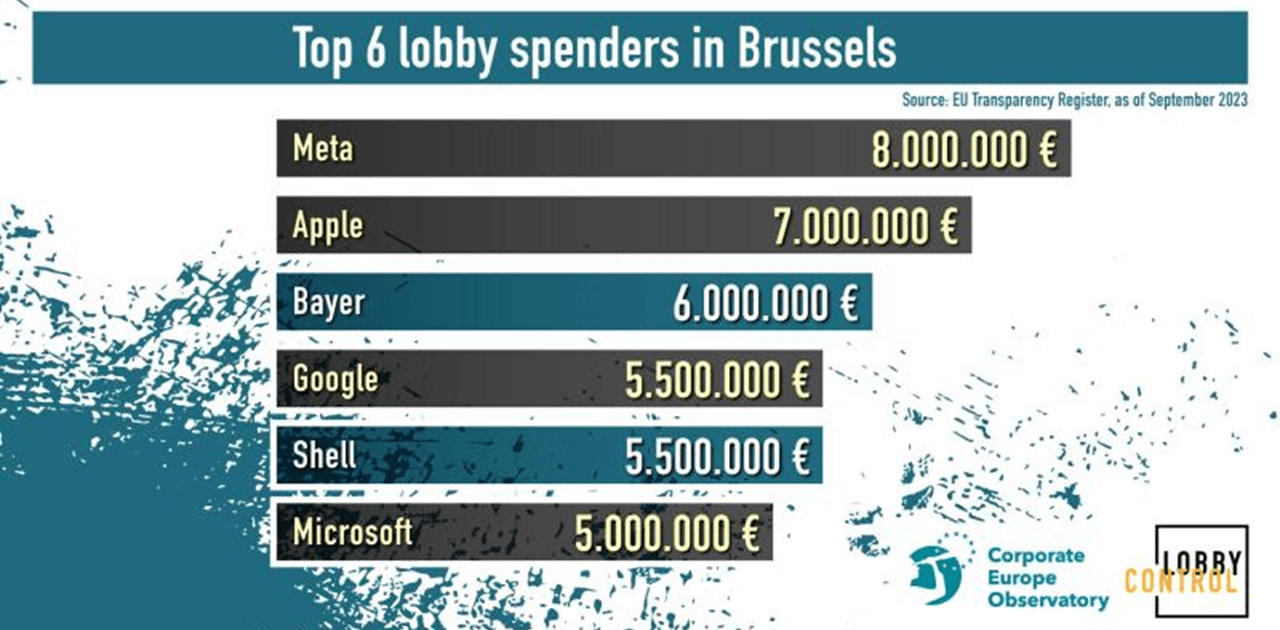A new updated report on the power and influence of digital corporations shows that the lobbying expenses of the tech industry have increased around 16.5%, from €97 to €113 million in just two years. The research is based on the website LobbyFacts which provides official EU lobby data and documents a total of 651 companies and business associations lobbying the EU’s digital policies.
The original report was published in 2021 by LobbyControl and Corporate Europe Observatory.
The biggest impact comes from big tech
Today life can’t be imagined without the impact of some of the very well-known names in the digital ecosystem. Big tech companies including Alphabet (Google), Apple, Facebook, Amazon, and Microsoft are not just integral parts of our lives – they shape our future in every way. And the one that often we might not see or feel is their impact on shaping new regulations of the digital ecosystem.
Two years ago, just ten companies were responsible for almost a third of the total tech lobby spend:
- Vodafone
- Qualcomm
- Intel
- IBM
- Amazon
- Huawei
- Apple
- Microsoft
... spent more than €32 million making their voices heard in the EU. Two years later, the top 10 digital groups alone - including Meta, Google, Apple, Microsoft and Amazon - are responsible for over a third of the overall sector's lobby spending, with a budget of €40 million.
It is clear that the tech sector continues to lead the way in terms of spending, ahead of the top 10 companies in the automobile and finance sectors.
"With their immense lobby power, Amazon, Meta & Co are trying to influence policy in the EU. This increase in resources for lobbying with a simultaneous increase in market concentration in this sector is worrying." - Verena Leyendecker from LobbyControl
Meta leads the pack
At the top of the EU's transparency register of all companies by the lobby spending is Meta (formerly Facebook) which increased its spending from €5.75 million in 2021 to €8 million in 2023. With these numbers, it becomes the financially strongest (tech) company in the entire lobby register.
Apple isn't far behind, doubling its lobby spending in two years, from €3.5 to €7 million.
Semiconductor manufacturer Qualcomm's spending also grew to €4 million in 2023 which is significantly higher compared to €1.75 in 2021.

Meta takes double first place, as when it comes to the number of lobbyists, it has 17.05 full-time equivalents (FTEs). It is followed by companies such as Intel (10 FTEs) and IBM (7.25 FTEs). In addition, Google (from 5.5 to 8.7 FTEs), Amazon (from 5 to 8 FTEs), and Apple (from 4.5 to 7.5 FTEs) also employ more lobbyists than they did in 2021.
Based on these numbers, one thing is sure, Big Tech is getting stronger - not only in terms of its lobby spending, but also the number of lobbyists it employs.
“These numbers show that Big Tech’s already immense presence has continued to grow exponentially over the past few years. Money should not buy access and influence to EU decision-making, but that seems to be exactly what these digital giants are aiming for.
Their lobbying not only threatens to fatally water down crucial legislation such as the Artificial Intelligence Act, but also undermines democratic decision-making. These numbers are another wake-up call to urgently close off privileged access for corporate lobbyists.” - Bram Vranken from Corporate Europe Observatory (CEO)
Overall, the comparison with 2021 demonstrates that Big Tech firms are investing increasing amounts of money in attempts to influence EU policy in their favour. The massive amount of laws in the digital industry is not the only factor contributing to the increasing lobbying.
The use of artificial intelligence is now governed by legislation, for example, in addition to the Digital Markets Act (DMA) and the Digital Services Act (DSA). The EU wants to decrease the lobbying impact of Amazon, Google, and Co. and is trying to do that by strengthening its laws against unilateral lobbying. Using the Digital Markets Act (DMA) to restrain the economic monopolistic power of digital corporations is one way. And we will see if it will succeed.
Lead image: photo collage created via William Hook and Vecteezy



Would you like to write the first comment?
Login to post comments